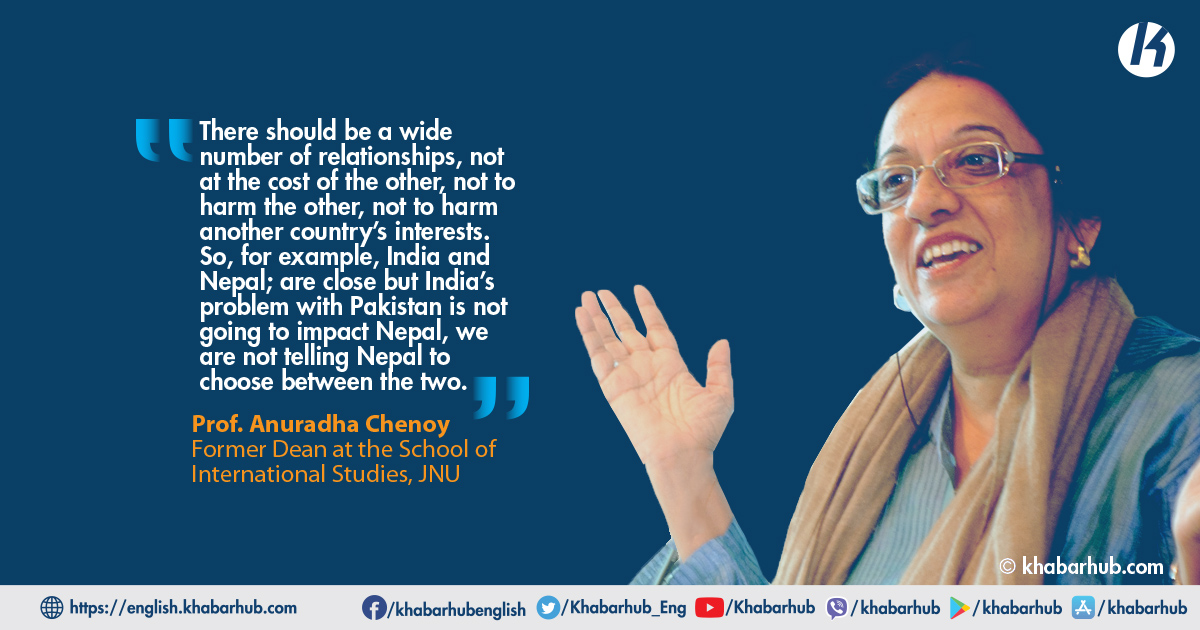Prof. Anuradha Chenoy is the former Dean at the School of International Studies, Jawaharlal Nehru University, New Delhi.
She has been Chairperson of Area Studies and Director of the Centre for Russian and Central Asian Studies. She has evaluated the work of organizations like Focus on the Global South, Asia Europe Peoples Forum and worked with several international organizations such as UN Women, UN PeaceKeepers, UNESCO and others.
She has several publications on security studies, development studies and gender studies, to name a few – Maoist and Other Armed Conflicts, Reemerging Russia: Structures, Institutions and Processes, The Making of New Russia, Comparative Politics and Crisis of Governance: The Russian Conundrum, Militarism and Women in South Asia.
Dr. Pramod Jaiswal, Strategic Affairs Editor at Khabarhub, spoke to Prof. Anuradha Chenoy on Russia-South Asia Relations.
The result of “The ORF Foreign Policy Survey 2021: Young India and the World” listed Russia as the third trusted great power after the US and Australia among the Indians.
But the ties between China and Russia, and India and the US are likely to grow further in the coming days. Do you think the China and US factor will impact India-Russia ties?
The fact that Russia is third after the US and Australia is also a bit of a surprise because usually it’s either one or two and it has been for a very long time, in fact, if you do a broader survey, I think people have a lot of confidence in Russia because of how Russia has been with India since India’s independence.
Especially since the 50’s when they supported India’s public sector, when India was isolated because the US was taking military sides, they wanted CENTO, SEATO, and the US to have close relations with Pakistan.
So, India was not comfortable with the US for years and years, for example during the Bangladesh war, when again India received Russia’s support.
Even in the Sino-Indian conflicts, Russia was either neutral in the ’60s or they were with India and later in recent times, they have actually used their leverage with China to withdraw and have negotiations, continue with peace talks, etc.
So, Indian – Russia ties are actually very special, very long-term, very strategic, it’s the biggest defense partner of India.
India’s almost 60 percent defense still comes from Russia. So, the big platforms are India – Russia based transfer of technology, India’s investments in oil in Siberia, etc but as you said, now in the current period, it is a fact that Russia has been pushed closer and closer to being a strategic partner with China because both are being isolated by the US.
In fact, whether it’s Trump or whether it’s Biden there is a whole idea of containing China and stopping Russia from pursuing its own interests in Ukraine or Belarus, it continues.
Therefore, Russia and China’s interests have converged more and more and with this new Australia, UK, US Indo-Pacific kind of trilateral partnership, it’ll get even closer.
China of course has been very close to Pakistan, they say it’s a very deep relationship and it will continue to be. So, where does that leave Russia and India?
Quite frankly, Russia has so far tried to balance India in all this. Just like India is balancing with the US, India is saying we have relations with the US now but it is not at the cost of Russia.
Similarly, Russia is saying we will have relations with China but it will not be at the cost of India and they continue to have relations and that is the essence of a multi-polar world.
In a multi-polar world, I think strategic analysts should stress this, it can never be and it should not be either, or.
There should be a wide number of relationships, not at the cost of the other, not to harm the other, not to harm another country’s interests.
So, for example, India and Nepal; are close but India’s problem with Pakistan is not going to impact Nepal, we are not telling Nepal to choose between the two. So, that’s how even the big powers should assume these relationships and this is what I believe should be the way.
How will India’s increasing closeness with Russia shape and condition the Indian strategic calculation? How would you define the India-Russia partnership in changing world order?
India – Russia partnership is not new. They have been extremely engaged in almost all issues.
For example; in Central Asia, India is very keen to have deeper engagement with Central Asia but Russia is not nervous about that.
They are welcoming India’s engagement with Central Asia. They are encouraging India to have negotiations with China even if these have not worked out but whatever it is, they always back it that it is in the interest of the world and world peace if India and China negotiate.
Now with Afghanistan for example, it is Russia that has tried to bring India on the negotiating table because they are saying, the regional countries’ stability matters for Afghanistan’s stability. They are not just for the US, Pakistan and China negotiating with Afghanistan.
They would also like Central Asian countries, they would like India to be there and in this whole new security scenario where everyone is worried about Afghanistan and the possibilities.
One, because of the problems of governance they may not be able to control the fundamentalist groups which are there, who can export threats or terror.
And two, the poppy trade, the more the west isolates them and puts sanctions as they have right now, the opium trade there is absolutely huge and earlier everyone was benefiting from it.
It was like, millions and millions of dollars and millions of Afghan people are involved in that trade. It doesn’t impact the US but it impacts Europe, Russia and India, very strongly and other kinds of illegal trafficking.
So, the Russian-Indian security partnership is strong and it will continue to be there. How will India react with AUKUS? because they are also a part of QUAD which is the US, India, Australia and Japan.
China saw it with some suspicion but QUAD, if you see the last few meetings, the focus was on COVID, climate, technology so it was not that much on military alliances.
And I think that’s what India would like and I would say that’s how it should be. Because military engagements are not safe for India, India has a huge border with China and we don’t want it to become an active enemy. Right now, the conflicts are frozen.
There have been two dozen talks on the border issues, maybe they are unresolved. But we don’t want active disengagement I think. That’s my view.

How is Russia going to engage with Afghanistan after the US withdrawal?
Unlike the other countries, you can see how closely Russia has to be engaged with Afghanistan. Number one, Tajikistan, Turkmenistan, Uzbekistan, all share borders.
The Russian army, the 201st motorized division, provides security between Tajikistan and the Afghan border because the Tajikistan state is very dependent on Russian security support.
So, Russian security organizations, like the Collective Security Treaty Organization (CSTO), etc. have said that one, they would not want to intervene in Afghanistan but they are very worried about the Afghan situation.
Two, they don’t want any intervention from any other country and three, they want the Afghan government to reassure them that they will not be a place where terror will be exported to other countries.
They would make sure that Central Asia is protected, after all, there are fundamentalist movements in Central Asia also, the IMU, there are terrorist groups functioning in Turkmenistan and others who are part of the underground opposition, who can easily get support from this.
Moreover, in the Russian Caucasus, in Chechnya for example, some oppositional underground groups have welcomed the Taliban and said, they welcome sharia law, they said this is a victory for us.
So, Russia is concerned about its own region, about Central Asia and for that, if you see the statements which are coming out they always say there should be a regional alliance, a security alliance and the Taliban government themselves should make sure that they control those interests which are likely to engage in illegal illicit kind of activities.
India–Russia geopolitical friction appears in their divergent approaches toward the Afghanistan conflict. While India has long opposed a political reconciliation between the Taliban and the government, Russia’s theory of regional stability has led it to support the Taliban. How likely will such divergence of approach impact the Indo-Russian relationship in the future?
This divergence in their approach to the Taliban’s current regime is based on their practical experience. Russia intervened in Afghanistan in 1979, etc. and withdrew after 10 years.
They had almost similar to the US but not as badly lost in that war. It caused a lot of damage to the former Soviet Union.
Whereas, India used to support the northern alliance against the Taliban and the Mujahideen at that time which is now no longer the case.
Russia has a pragmatic approach, they feel that to secure their own borders they have to engage with the Taliban but India wants some conditionalities; they want the condition that the Taliban must behave before they can recognize it.
They must get an assurance that ultimately they’ll have no option but to recognize the Taliban. However, they are waiting for some assurances that the Taliban will not be a major exporter of terror and that Pakistan will not use it.
There are other problems happening in Pakistan also. The Indian government and all of us in civil society, who are not representative of the government, also know that even Pakistan is getting impacted by this instability, this instability can increase in the days to come.
Similarly, there’s Iran has interests in the region. There are Hazaras, Shia, Sunni issues and Turkey, who used to man the Kabul airport.
So, there are so many factors playing and India has to watch. But I don’t think it will have a negative impact on India’s relations with Russia.
India will talk to Russia as they do things but of course, they will make their own independent position and will remain in contact with Russia.
It’s a kind of a given in Indian foreign policy. If you see the Indian political class, whichever government comes, whichever party comes if there’s consensus on one foreign policy issue, it’s Russia.
So, from left to right, from extreme left to extreme right everyone is okay with Russia but with the US there are some differences. Right now, of course, everyone feels you have no option but to engage with the US but to what extent, that varies and civil society is of course cautious about the US.
In a joint press conference following a 2018 summit with Pres. Vladimir Putin, Prime Minister Modi stated, “Russia and India agree on multipolarity and multilateralism in the world. However, Russia and India differ on which state is the target of the “multipolar reordering”- Russia wants an end to US hegemony, while India wants to preempt Chinese hegemony in Asia. In such a scenario, how do you assess their geopolitical interest?
This is a very important question on how you have put it and my view is somewhat different. What does multipolarity mean?
Multipolarity essentially means that there should be no one hegemon, that there can be multiple poles and one superpower. And there is one major superpower and many great powers, China has become number two but in number three and four positions are also Brazil, India, Indonesia, Turkey.
They are all important powers and now the scientific and technological revolution has spread far wide, just a single country that is rogue can cause planetary problems.
So, the concept of multipolarity itself says that there should be no one pole but multiple poles. If you go by that, of course, the US doesn’t want multipolarity and wants to retain their previous hegemonic position and China similarly is moving towards a hegemonic position.
But my whole argument is that now, in the current scenario, no country can have a hegemonic position in all fields, maybe the US and they will have hegemony in space and nuclear technology but so will Russia.
China and the US will compete with hegemony on economic, finance, banking, etc. Of course, the US has the dollar which controls 70-80 percent of world trading but the exchange is now between India and China and the BRICS, etc with their own currencies that are moving ahead slowly.
Likewise, Russia and China are doing their own currency swap deal and with their own partners also. Again, the US doesn’t have hegemony over that.
On soft power the US will have hegemony, has hegemony and will continue. This is because of their democracy, their films, their culture, the use of English, neither China nor Russia will be able to compete in the next 30, 40, 50 years.
They have a huge soft power hegemony and that’s a big advantage to them. So, my argument is of course India would like neither the US nor Chinese hegemony but they would like to remain a regional power.
However, for that, they also have to continue their own legitimacy. Earlier they were considered a leader in the third world, no longer.
Third world countries have also come up and there are other leaders. So, of course, India is not a superpower like either Russia or China but the fact is that they are a nuclear power, they are military power, they have a great Navy, they are also soft power.
So, in this system of multipolarity, there will be levels and you never know, there are some strategists who believe that the US and China can come to accommodate each other also and China can negotiate and say okay we’ll settle in the second position but leave us in peace.
At the moment the US is not willing to do so but China in the next 10, 15 years can force it if it continues at this kind of Chinese rate of growth and expansion. However, there’s opposition to China on the issue of Hong Kong, Taiwan, so, there are huge areas of conflict, but on hegemony I think Afghanistan could defeat the US so, leave alone anyone else.
Why is Russia no longer a strategic ally for India in the new bipolar world led by the US and China? Are Russia and Pakistan getting closer in recent times?
Russia and Pakistan are getting closer but it is not at the cost of India or any of their relationships. Nobody can ignore Pakistan, after all, it is a full state.
How can Russia say that we will never have good relations with Pakistan because Pakistan has bad relations with India?
Of course, sometimes India sees its foreign policy through the Russian prism but there is also, you know in this Indian strategic kind of vision, there is also independent thinking, where they will not spoil their relations with Russia because at the cost of Pakistan at all.
There will be no strategic fallout. So, that’s how it is, that Russia is not that close to Pakistan as yet and they will not be.
They are interested in curtailing any Pakistani action against Central Asia or becoming too close an ally with the Taliban.
So, they will engage with Pakistan but nowhere will it harm India’s strategic interests and Indo-Russian strategic relationship.
What are the continuities and changes when it comes to Russia and South Asia relations?
The continuities are that Russia sees South Asia as very important and they see their relations are different from US relations with countries.
The US relationship is always, you know, like a wheel of a cart, they are the hub and the other countries are the spokes.
So, they don’t have equal relations with anyone. They will have India-US relations, US-Nepal relations, they will keep them all separate and they will try to manipulate them.
Whereas Russia’s relations, they treat other countries, at least that’s what India has seen, more as equal partners, so other countries don’t feel used by them, whether its technology transfer, whether its treaties, etc.
So, the strategic relationship of South Asia with Russia will keep improving but they would like some quick responses.
The problem is many South Asian countries, the smaller ones- Sri Lanka, Nepal, Bangladesh, have to engage more with Russian trade, export-import, etc., have more openings, have more scholars learn the language.
There are problems with the Russian economy but they have a lot to give and they have no negative feelings towards any of the South Asian countries.
Of course, India has dominated Russian-South Asian relations. It was more India-Russia, but I think other countries should come into the way and activate their positions in an independent way with Russia also. There will be no problem for either Russia or India on this front.
In their sixth meeting in less than a year, the presidents of Russia and Belarus have agreed to deepen economic ties, leaving tougher political questions for later. Is this Kremlin’s latest signal to the west that it would stand by the Belarusian leader despite the storm of Western criticism over human rights abuses inside the country?
That’s right, Belarus also has a lot of pro-Russian factions. Ever since the Soviet Union dissolved, the Belarusian political elite had wanted deeper and deeper ties with Russia because they are dependent on Russia for everything.
They also have ethnic similarities but there is also a polarization where some in the political and strategic elite want to align more with the west and become part of NATO etc. The current Belarussian leadership Lukashenko is very unpopular.
There has been a huge protest against him because he is against the very small, nascent Belarusian democracy which has been rising.
But it’s in Russia’s interest to support him because they don’t want a leader to come in who would be and to Russia, and they have these kinds of threat perceptions.
They don’t want these countries to become too close to either the US or NATO etc. so, they have clamped down and supported the Belarusian government and for that the US is putting more sanctions on them and the threat perception of Russia wanting too much space is also increased with the west.
While more than 1,000 people gathered in Moscow to protest against the results of the recent polls, President Putin has praised parliamentary elections as “free and fair”. How do you view the election results? Was it a “democratic election process” as claimed by Putin?
Putin is a classic elected autocrat. He was elected and he is popular for a number of reasons. If you do a public survey on popularity, he gets 60-70 percent from western surveys, like Pew surveys, etc.
Why? Because of a number of reasons, there is no democratic culture in Russia. It takes years for a country’s democratic culture, the development of institutions, an opposition party, etc. to grow.
In Russia, the communist party is still the only major opposition party. Other parties have failed for a number of reasons, including the way Putin clamps down and targets opposition leaders, he doesn’t allow it.
There is something, either cases or murder, something or the other which happens. So Russian democracy is not a full democracy in any case but it’s more of a democracy than let’s say Chinese democracy where there is none.
In the Russian democracy, there are elections but Putin’s party, The United Russia Party, gets a majority and a lot of people are either cynical, or they won’t vote, or they will vote Putin or they will, the communists. So, no third force as such has been able to emerge.
Navalny was there, but you saw what happened to Navalny. Everyone in the world saw it. He was kind of poison, he went to the west, he was rescued, he is back, he is in jail.
So, people are scared of being part of the opposition. So, what kind of democracy is that? So, in a sense, it’s a populist autocracy because Putin has also given a lot of social justice measures like the old Soviet state, pensions, employment, housing, free education, health.
Thus, people are satisfied with these kinds of things also. But for democracy, Russia has a long way to go. It’s not a democracy yet.









Comment